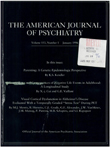Recovery of brain glucose metabolism in detoxified alcoholics
Abstract
OBJECTIVE: To differentiate withdrawal-related abnormalities in brain glucose metabolism among alcoholics from abnormalities that may be irreversible or antedate alcohol use, the authors evaluated metabolic recovery during alcohol detoxification. METHOD: Regional brain glucose metabolism was measured with positron emission tomography and 2-deoxy-2- [18F]fluoro-D-glucose in 10 male alcoholics at 8-15 days, 16-30 days, and 31-60 days after last use of alcohol. The alcoholics' metabolic values were compared with those of 10 age-matched male healthy volunteers. RESULTS: Brain metabolism increased significantly during detoxification. There were significant differences in global and regional measures between the first and last time points but not between the second and third points, suggesting that recovery occurred predominantly within 16-30 days. Regional increases in metabolism were greater in the frontal regions. Whereas during the first evaluation the alcoholics showed significantly lower metabolism in various brain regions than the comparison group, at the end of detoxification the alcoholics showed significantly lower absolute and relative metabolic values in the basal ganglia and lower relative metabolic values in the parietal cortex. Among the alcoholics, but not the comparison group, metabolism in the frontal, parietal, and left temporal cortexes was negatively correlated with years of alcohol use and with age. CONCLUSIONS: This study shows significant increases in brain metabolism during alcohol withdrawal and documents persistent low metabolic levels in the basal ganglia of detoxified alcoholics.
Access content
To read the fulltext, please use one of the options below to sign in or purchase access.- Personal login
- Institutional Login
- Sign in via OpenAthens
- Register for access
-
Please login/register if you wish to pair your device and check access availability.
Not a subscriber?
PsychiatryOnline subscription options offer access to the DSM-5 library, books, journals, CME, and patient resources. This all-in-one virtual library provides psychiatrists and mental health professionals with key resources for diagnosis, treatment, research, and professional development.
Need more help? PsychiatryOnline Customer Service may be reached by emailing [email protected] or by calling 800-368-5777 (in the U.S.) or 703-907-7322 (outside the U.S.).



